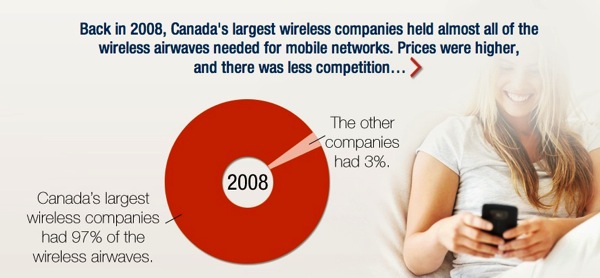
Ottawa Failing to Drive Wireless Competition In Light of Price Hikes: Analysts

Are wireless users in Canada better off or worse after the Federal Government’s claims of putting “consumers first” and lowering prices and increasing competition?
According to industry analysts, Ottawa has failed to lower prices since Rogers, Telus and Bell were able to increase prices on some voice and data plans, in the face of limited competition from existing wireless entrants.
Eamon Hoey from Hoey and Associates Management Consultants in Toronto, said yesterday Ottawa hasn’t lived up to its promises of lower prices coming, reports The Canadian Press:
“It shows the bankruptcy of their so-called policy and their claims that they were going to be friends to the consumers…They really lacked a plan as to how they were going to do this.”
Hoey went on to say even though Ottawa’s recent wireless ad blitz wasn’t particularly effective in explaining policy, it did inform consumers “they were getting gouged, correctly or incorrectly.”
Telecom analyst Iain Grant said while Ottawa said “What we are seeing now is merely proof that three alternatives are not enough to safeguard the consumer interest.” He continued to say Ottawa looks to put pressure on incumbents by capping the roaming rates they can charge smaller rivals.
Analyst Brahm Eiley from the Convergence Consulting Group in Toronto said Videotron in Quebec and Eastlink in Atlantic Canada are competitive in their regions, along with MTS in Manitoba and SaskTel in Saskatchewan, while Wind and Mobilicity offer prices “drastically less” than incumbents.
As for recent price increases specifically in Ontario, Alberta and BC by the Big 3? Eiley says “they’ve done this because they can.” Since 2012 price creeps have resulted in average revenue per user growth for incumbents and smaller rivals, but are unsustainable for the latter.
Wireless incumbents responded to the story by citing how plan pricing structure has changed.
Telus said despite raising monthly prices by $5 for new nationwide plans, it also lowered data prices by $5 as well on its ‘most popular’ plans.
Bell said even though there was a price jump on its higher end plans, it also added more data options. It also emphasized it had “decreased prices at least a dozen times since last November due to the competitive situation.”
Rogers responded customer data-usage habits are changing, with most users consuming 1-2GB per month which is “why we didn’t change the price of our popular 1GB plan ($85/month) and why we introduced a new 2GB plan for only $5 more,” said spokeswoman Patricia Trott.
Jake Enwright, spokesman for Industry Minister James Moore, reiterated the government’s plan to lower prices via competition: “From the 700 MHz spectrum auction, to tower sharing and capping roaming costs, we are taking concrete actions to put consumers first.”

